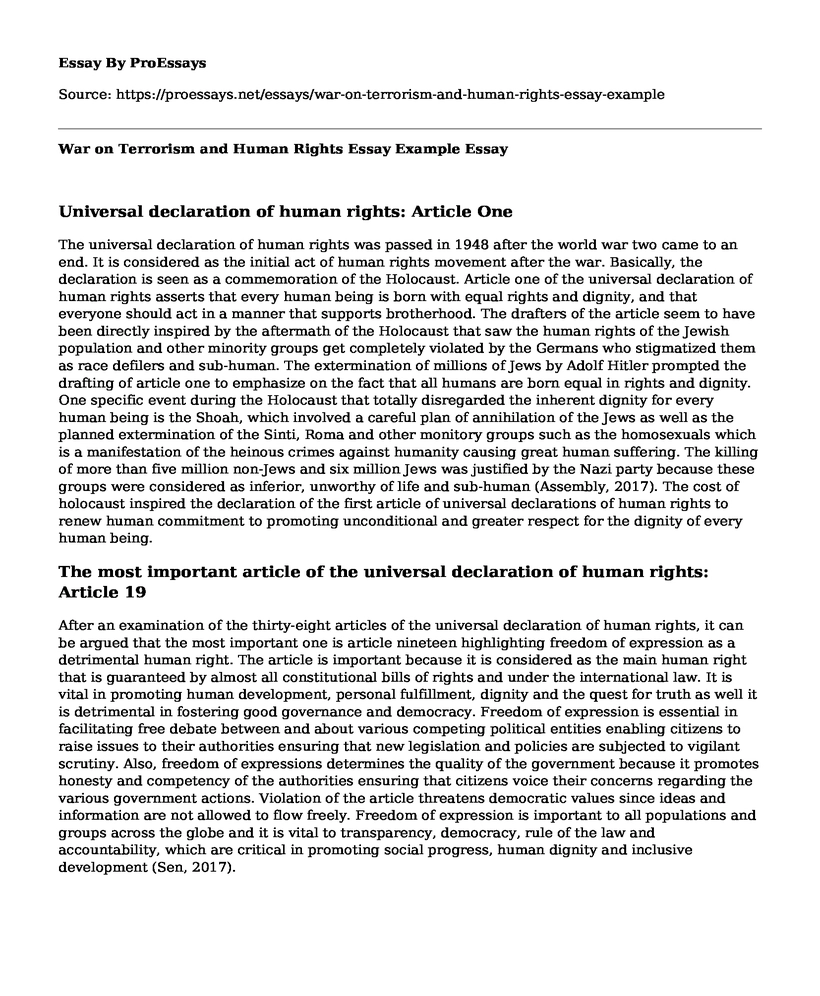Universal declaration of human rights: Article One
The universal declaration of human rights was passed in 1948 after the world war two came to an end. It is considered as the initial act of human rights movement after the war. Basically, the declaration is seen as a commemoration of the Holocaust. Article one of the universal declaration of human rights asserts that every human being is born with equal rights and dignity, and that everyone should act in a manner that supports brotherhood. The drafters of the article seem to have been directly inspired by the aftermath of the Holocaust that saw the human rights of the Jewish population and other minority groups get completely violated by the Germans who stigmatized them as race defilers and sub-human. The extermination of millions of Jews by Adolf Hitler prompted the drafting of article one to emphasize on the fact that all humans are born equal in rights and dignity. One specific event during the Holocaust that totally disregarded the inherent dignity for every human being is the Shoah, which involved a careful plan of annihilation of the Jews as well as the planned extermination of the Sinti, Roma and other monitory groups such as the homosexuals which is a manifestation of the heinous crimes against humanity causing great human suffering. The killing of more than five million non-Jews and six million Jews was justified by the Nazi party because these groups were considered as inferior, unworthy of life and sub-human (Assembly, 2017). The cost of holocaust inspired the declaration of the first article of universal declarations of human rights to renew human commitment to promoting unconditional and greater respect for the dignity of every human being.
The most important article of the universal declaration of human rights: Article 19
After an examination of the thirty-eight articles of the universal declaration of human rights, it can be argued that the most important one is article nineteen highlighting freedom of expression as a detrimental human right. The article is important because it is considered as the main human right that is guaranteed by almost all constitutional bills of rights and under the international law. It is vital in promoting human development, personal fulfillment, dignity and the quest for truth as well it is detrimental in fostering good governance and democracy. Freedom of expression is essential in facilitating free debate between and about various competing political entities enabling citizens to raise issues to their authorities ensuring that new legislation and policies are subjected to vigilant scrutiny. Also, freedom of expressions determines the quality of the government because it promotes honesty and competency of the authorities ensuring that citizens voice their concerns regarding the various government actions. Violation of the article threatens democratic values since ideas and information are not allowed to flow freely. Freedom of expression is important to all populations and groups across the globe and it is vital to transparency, democracy, rule of the law and accountability, which are critical in promoting social progress, human dignity and inclusive development (Sen, 2017).
War on Terrorism and Human Rights
War on terrorism is an example of a major ongoing conflict in the world whose causes have raised an unanswered question regarding human rights issues. Article five of the declaration of human rights stipulates that no human is to be subjected to any degrading or inhuman treatment, torture or punishment but the ongoing war on terrorism violates the declaration. The war on terrorism has challenged the human rights framework to an extent that it appears to collapse and this is mainly because human life is deliberately targeted and considered as collateral damage, especially when the mass bombing is committed indirectly or directly leading to disease, destruction of homes, suffering, and death (Peters, 2015).
During the war, particularly those lasting for many years, almost every aspect of human right is violated considering that it leads to a breakdown of health systems, education systems, food and water supplies, homes, work, accountability issues by the authorities, freedom of free speech and press as well as the failure of the legal system. Acts of war subjects minority groups, women, children, refugees and the elderly to human suffering and torture which is a violation of article five. War on terrorism has led to the massive breakdown of humanity acts undermining and sidelining the core values of human rights as well as the legal system protecting them. Nonetheless, human rights have continued to play a vital role despite a deteriorated state has continued to offer limited protection and offer hope for justice. Despite that national emergencies and war permit states to temporarily put on hold some of its human rights commitments, specific human rights, including the to be free from any kind of degrading treatment and torture, as well as the right to life, is never derogated because they are considered as the most vital and must be observed even when the state's security is threatened.
References
Assembly, U. G. (2017). Universal declaration of human rights (217 [III] A). Paris
Peters, L. (2015). The Development of the Universal Declaration of Human Rights. In The United Nations (pp. 109-139). Palgrave Macmillan, New York.
Sen, A. (2017). Elements of a theory of human rights. In Justice and the Capabilities Approach (pp. 221-262). Routledge.
Cite this page
War on Terrorism and Human Rights Essay Example. (2022, Aug 18). Retrieved from https://proessays.net/essays/war-on-terrorism-and-human-rights-essay-example
If you are the original author of this essay and no longer wish to have it published on the ProEssays website, please click below to request its removal:
- Paper Example on Corporal Punishment and Child Abuse
- Immigration and Customs Enforcement (ICE) Essay Example
- Examining Gun Wounds Paper Example
- Essay Sample on Addiction Models: Sociological Construct Most Appropriate
- High Rent Prices in SF Bay Area: The Cause of Unaffordable Housing - Research Paper
- On-Campus Students: Battling Crime and Social Evils - Essay Sample
- Essay Example on Global Refugee Crisis: 44,000 Displaced Persons Daily in 2017







